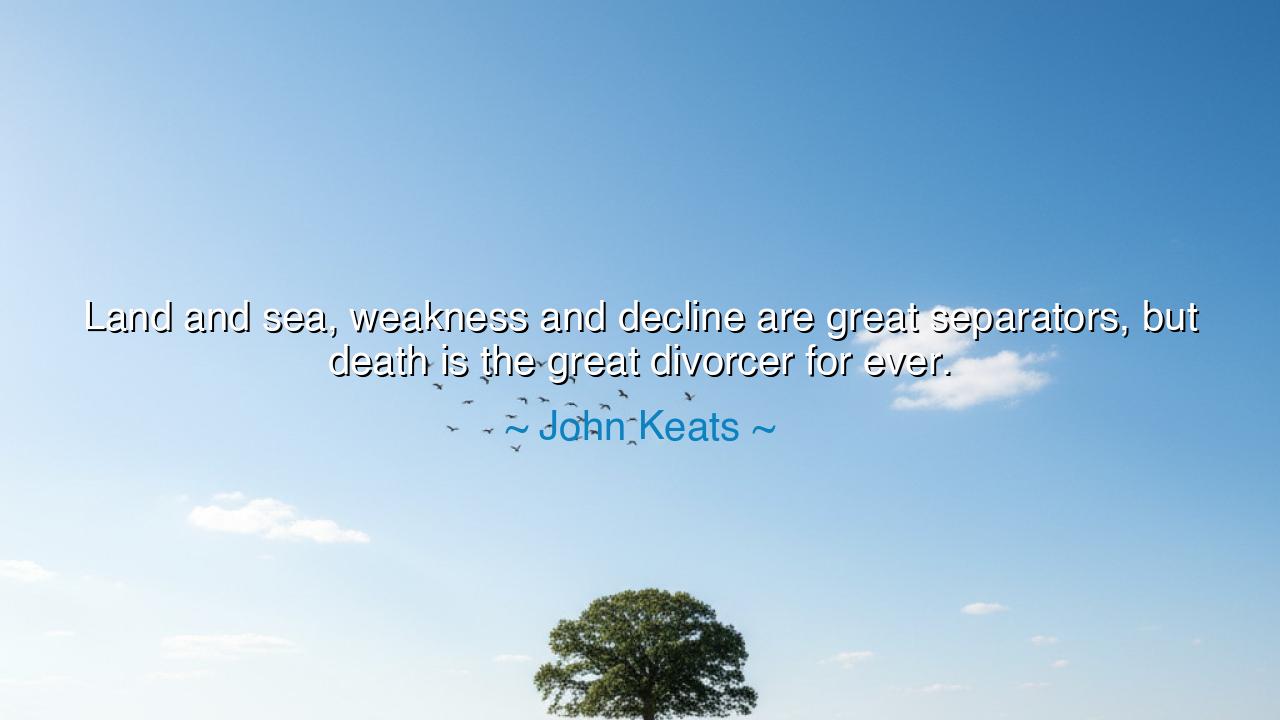
Land and sea, weakness and decline are great separators, but
Land and sea, weakness and decline are great separators, but death is the great divorcer for ever.






“Land and sea, weakness and decline are great separators, but death is the great divorcer for ever.” — John Keats
In this haunting and beautiful line, John Keats, the poet of passion and mortality, speaks of the most profound of human truths — the finality of death. His words tremble with the sorrow of one who loved life deeply, yet felt death’s cold breath far too soon. To Keats, the world was filled with beauty — the rustle of leaves, the glow of starlight, the tenderness of love — yet always shadowed by impermanence. In this quote, he names the forces that pull hearts apart — distance, illness, frailty — but declares that death alone is the great divorcer, the final and irreversible parting of soul from body, and of the living from those they hold dear.
Keats wrote these words in a letter during his last, lingering illness, when he was exiled from his beloved England to the warmer air of Italy, in the hope that it might ease the ravages of tuberculosis. He was separated from Fanny Brawne, the woman he loved, by land and sea, by weakness and decline — the very things he names in his lament. Yet these separations, though painful, still left hope. Letters could be written, memories cherished, dreams imagined. But death — death would end even that. In naming it the “great divorcer,” Keats faces the deepest fear of the human heart: that what we love most must, in the end, slip beyond our reach.
Yet his words are not only of despair. They also reveal the depth of human attachment, the measure of love that makes death so terrible. Only those who love greatly can feel separation as he did. To Keats, death is not merely the ceasing of breath; it is the tearing of connection, the breaking of communion between two souls who once shared the same rhythm of life. The ancients, too, understood this pain. The Greek poet Euripides wrote that “no man loves life like him who is growing old,” for as death nears, one clings more fiercely to what is passing. In this, Keats joins the chorus of mortals who have loved the world too much to leave it easily.
Still, there is a strange nobility in his acceptance. He does not rage against the truth; he names it with clarity and reverence. He acknowledges that time and illness can part lovers, that oceans can keep friends distant, but only death can separate forever. To call death a divorcer is to give it both gravity and justice — for it divides not in cruelty, but by the very law of existence. Just as night must follow day, death follows life. The poet does not curse it; he bows before its inevitability, even as he mourns what it takes. This is the wisdom of one who sees both the sorrow and the sacredness in the fleeting nature of all things.
History gives us many who have lived this truth. Consider Marcus Aurelius, the philosopher-emperor, who lost his children, his wife, and his friends, yet wrote, “You could leave life right now. Let that determine what you do and say and think.” He, too, knew that death is the final separation — but rather than despair, he used the awareness of mortality to live more meaningfully, to love more purely. The same truth lies in Keats’s lament. By acknowledging death as the great divorcer, he reminds us to cherish every connection while it still breathes. For though death divides, love’s beauty lies in its impermanence — in the courage to love even when we know we will lose.
In the modern world, where we flee from death and disguise it in silence, Keats’s voice rises like that of a prophet. He calls us not to ignore mortality, but to look upon it with tender honesty. For to remember that all things end is not to despair, but to awaken. It teaches us to forgive more easily, to speak our hearts before the moment passes, to hold close the hands of those we love while we still can. In every human life, there will be separation — by distance, by frailty, by circumstance — but the final parting will come to all. To live wisely is to live in awareness of that truth, and to let it deepen our gratitude for each precious breath.
So, O listener, take this lesson to heart: let the shadow of death teach you to love the light. Do not wait for absence to reveal what was dear. Write the letter, speak the kindness, offer the embrace. For land and sea may part us, weakness may slow us, and time may fade our strength — but while you yet live, your love can bridge every distance. Death may be the great divorcer, but while life endures, love remains the great uniter — the fire that burns even as darkness gathers. And though death may silence the body, the virtue of love, once given, remains eternal, echoing beyond the veil in the memory of all it has touched.






AAdministratorAdministrator
Welcome, honored guests. Please leave a comment, we will respond soon